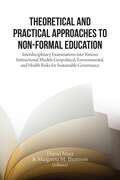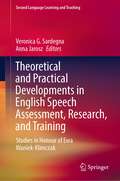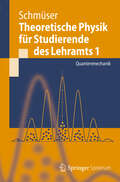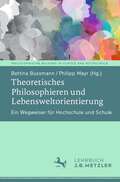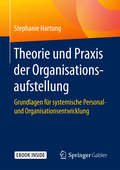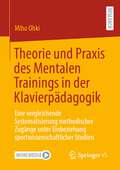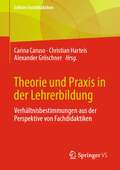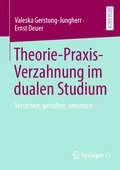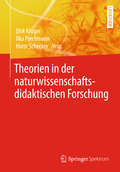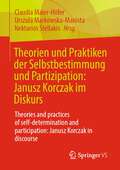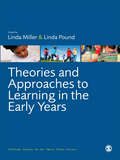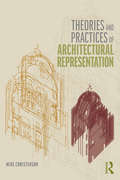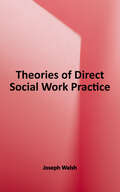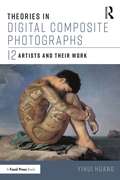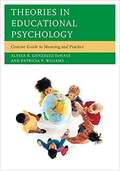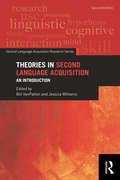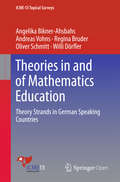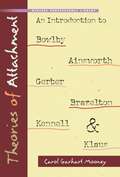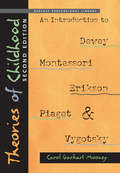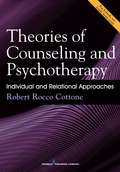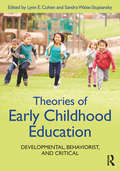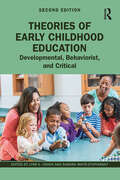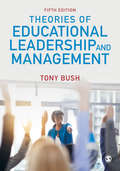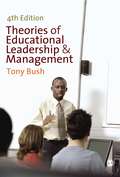- Table View
- List View
Theoretical and Practical Approaches to Non-Formal Education: Interdisciplinary Examinations into Various Instructional Models
by Daniel Mara Margareta M. ThomsonIn this collection of work, the contributing authors tackle the topic of non-formal education from a variety of disciplines, such as computer science, psychology, education, science education, literacy, music, art, and social studies by sharing original p
Theoretical and Practical Developments in English Speech Assessment, Research, and Training: Studies in Honour of Ewa Waniek-Klimczak (Second Language Learning and Teaching)
by Anna Jarosz Veronica G. SardegnaThis edited book presents and discusses theoretical, practical, and research developments in English pronunciation in order to establish evidence-based directions and recommendations for best practices in English speech assessment, research, and training. It features leading pronunciation experts from diverse contexts who share cutting-edge research and valuable insights. The collection consists of six parts. Part 1 introduces the aims, focus, and structure of the book, and describes its intended audience. Part 2 reviews, provides empirical evidence, and offers critical analyses guiding different aspects of English speech assessment. Parts 3 and 4 report empirical findings and research perspectives on the perception and production of English speech. Part 5 shares current practices in phonetic training and their effect on learners and listeners. Part 6 presents theoretical perspectives on the acquisition of phonology in multilinguals.
Theoretische Physik für Studierende des Lehramts 2
by Peter SchmüserDas zweibändige Lehrbuch vermittelt die Grundlagen der theoretischen Physik und berücksichtigt dabei besonders die Quantenmechanik, die spezielle Relativitätstheorie und die Elektrodynamik für den Unterricht an Gymnasien. Band 2 bietet eine systematische Einführung in die Elektrodynamik auf Basis der Maxwellschen Gleichungen sowie eine Einführung in die relativistische Mechanik. Der Stoff wird einfach und klar dargestellt, Abbildungen und didaktische Anmerkungen erleichtern den Zugang zur Theorie und geben Hinweise für die Vermittlung im Unterricht.
Theoretisches Philosophieren und Lebensweltorientierung: Ein Wegweiser für Hochschule und Schule (Philosophische Bildung in Schule und Hochschule)
by Philipp Mayr Bettina BussmannDie globalen Veränderungen fordern unser Wissen über die Welt und über uns selbst heraus. Der Klimawandel, die globale Covid-19-Pandemie und Konflikte um die Bedeutung wissenschaftlicher Erkenntnisse führen uns unweigerlich zu einer Vielzahl komplexer philosophischer Fragen. Dabei rücken verstärkt Themen der theoretischen Philosophie in den Vordergrund: Was ist eigentlich Wissen? Auf welche Informationen können wir uns verlassen? Ist die Wahrheit relativ? Was macht ExpertInnen aus? Was ist gute wissenschaftliche Praxis? Was bedeutet ‚evidenzbasiert‘? Welchen sozialen und globalen Einflüssen ist unser Wissenserwerb ausgesetzt? In der Ausbildung von Philosophie- und Ethikstudierenden gibt es oft eine große Scheu, Disziplinen wie Erkenntnistheorie und Wissenschaftsphilosophie zu erlernen und zu unterrichten. Zu abstrakt und lebensweltlich irrelevant, sagen viele. Dieses Buch soll diese Berührungsängste beseitigen helfen, indem die theoretischen Grundlagen auf die Probleme der Gegenwart angewendet und mit vielseitigen Methoden erschlossen werden. Zwei Ziele stehen im Vordergrund: Zum einen soll deutlich werden, dass die Beschäftigung mit theoretischer Philosophie für das persönliche und das gesellschaftliche Zusammenleben von zentraler Bedeutung ist. Zum anderen zeigen eine Reihe didaktischer Tools, wie man Lernende dabei aktiv in den Lernprozess miteinbezieht.
Theorie und Praxis der Organisationsaufstellung: Grundlagen Für Systemische Personal- Und Organisationsentwicklung
by Stephanie HartungDie Methode der Organisationsaufstellung hat sich als effektives Tool für Personal- und Organisationsentwicklung erwiesen. Dieses Buch stellt das nötige theoretische Wissen vor und ergänzt dies mit zahlreichen Praxisbeispielen. Schritt für Schritt beschreibt die Autorin die beste Herangehensweise, den Prozess der Anwendung sowie die Nachbereitung einer systemischen Aufstellung. Neben einem umfassenden Verständnis für Organisationen vermittelt das Buch ausführliches Wissen über die Einsatzmöglichkeiten von Organisationsaufstellungen in der Personal- und Organisationsentwicklung und zeigt übersichtlich, wie man die Systemaufstellung in der Praxis anwendet. Mit dieser detailreichen Einführung in die systemische Organisationsentwicklung empfiehlt sich das Buch gleich für mehrere Zielgruppen. Lehrenden und Lernenden der Organisationsaustellung dient es als übersichtliches Grundlagenwerk, während Organisations- und Personalentwickler es als ein Standardwerk zur Ergänzung ihres Methodenrepertoires schätzen werden. Unternehmer und Manager, die sich über dieses effektive Tool informieren wollen, finden in dem Buch umfangreiche Informationen über die komplexitätsreduzierenden Methoden der systemischen Organisations- und Personalentwicklung.
Theorie und Praxis des Mentalen Trainings in der Klavierpädagogik: Eine vergleichende Systematisierung methodischer Zugänge unter Einbeziehung sportwissenschaftlicher Studien
by Miho OhkiAuftrittsangst ist ein weit verbreitendes Phänomen unter Musikern. Das Ziel der Forschung ist, mit Hilfe der Sportpsychologie die Techniken des Mentalen Trainings für die Klavierpädagogik systematisch und praxisorientiert auszubauen. Den Kern der Arbeit bilden folgende drei Forschungsfragen: 1. Welche Methoden des Mentalen Trainings werden in den Bereichen von Musik und Sport angewendet? 2. Ist es möglich, die Methoden des Mentalen Trainings für Musikausübende anzuwenden und in den Klavierunterricht systematisch zu integrieren? 3. Kann eine regelmäßige Anwendung des Mentalen Trainings den Umgang mit der Auftrittsangst verbessern? Um die erste Frage zu beantworten, wird zuerst die Fachliteratur beider Bereiche (Musik und Sport) betrachtet. Danach werden die in beiden Disziplinen genutzten Methoden systematisiert und ausführlich dargestellt, um die Anwendbarkeit des Mentalen Trainings im musikalischen Bereich zu überprüfen und systematisch in den Klavierunterricht zu integrieren. Anschließend wird der Einsatz des Mentalen Trainings in der Klavierpädagogik anhand einer kleinen Studie untersucht und hinsichtlich seiner Effektivität ausgewertet.
Theorie und Praxis in der Lehrerbildung: Verhältnisbestimmungen aus der Perspektive von Fachdidaktiken (Edition Fachdidaktiken)
by Christian Harteis Carina Caruso Alexander GröschnerDer Band unternimmt den Versuch, Beiträge aus unterschiedlichen Fachdidaktiken zusammenzutragen, die sich der Verhältnisbestimmung von Theorie und Praxis widmen und der Frage nachgehen, wie eine Verknüpfung von Theorie und Praxis am Lernort Hochschule konzipiert, angeleitet und erfolgreich gestaltet werden kann. Die Beiträge aus unterschiedlichen Domänen skizzieren, wie das im Zusammenhang mit Praktika obligatorische Lehren, Lernen und Forschen als Lerngelegenheit gestaltet werden kann, sodass angehende Lehrpersonen Theorie und Praxis miteinander in Beziehung setzen, relationieren und systematisieren und somit die Professionalisierung durch Praktika einen nachhaltigen Lerngewinn erzielt.
Theorie-Praxis-Verzahnung im dualen Studium: Verstehen, gestalten, umsetzen
by Valeska Gerstung-Jungherr Ernst DeuerDie Theorie-Praxis-Verzahnung (TPV) ist das Markenzeichen des dualen Studiums – doch was sie genau ausmacht und wie sie optimal umgesetzt werden kann, ist oft unklar. Dieses Buch analysiert die TPV umfassend und entwickelt anwendungsorientierte Konzepte zur erfolgreichen Verbindung akademischer und berufspraktischer Bildung. Es definiert die theoretischen Grundlagen, Funktionen und Wirkmechanismen der TPV, zeigt konkrete Ansätze zur Einbindung in Studienstrukturen, Lehrpläne und Praxisphasen und gibt Hochschulen, Berufsakademien sowie dualen Partnern praxisorientierte Handlungsempfehlungen. Zugleich liefert es wertvolle Impulse für die Gestaltung praxisnaher Studienformate jenseits des dualen Studiums und trägt zur Diskussion um den Praxisbezug in der Hochschulbildung bei. Ein fundiertes Grundlagenwerk für alle, die TPV verstehen, weiterentwickeln und zukunftsfähig gestalten wollen.
Theorien in der naturwissenschaftsdidaktischen Forschung
by Dirk Krüger Ilka Parchmann Horst ScheckerDas Buch stellt wichtige theoretische Konzepte für die naturwissenschaftsdidaktische Forschung vor. Diese bilden die Grundlage für die Herleitung naturwissenschaftsdidaktischer Fragen und Hypothesen und die Entwicklung eines Forschungsdesigns. Das Buch liefert eine Basis, um im Rahmen von Bachelor-, Master- oder Promotionsarbeiten den aktuellen Forschungsstand weiter zu entwickeln. Ziel ist es, Nachwuchsforschern ein begriffliches Gerüst für das eigene Vorgehen zu geben, Ergebniserwartungen begründbar zu machen und Ergebnisse in der Auswertung zu erklären. Dem interdisziplinären Autorenteam gelingt es, durch ihre Forschungserfahrung den aktuellen Wissensstand von der Theorie bis zur Anwendung profund darzulegen. Durch die interdisziplinäre Herangehensweise wird der fachübergreifende Nutzen der beschriebenen Theorien besonders deutlich. Das Buch ergänzt den Band „Theorien in der biologiedidaktischen Forschung“ und steht in einer Reihe mit dem Band „Methoden in der naturwissenschaftsdidaktischen Forschung“.
Theorien und Praktiken der Selbstbestimmung und Partizipation: Theories and practices of self-determination and participation: Janusz Korczak in discourse
by Claudia Maier-Höfer Urszula Markowska-Manista Nektarios StellakisDieser Band repräsentiert den gegenwärtigen Diskurs, der an das Werk von Janusz Korczak anschließt und seinem Vermächtnis gewidmet ist. Aktuelle Dynamiken des Aufwachsens und der Bildung von Kindern an verschiedenen Orten in Europa werden von unterschiedlichen Autorinnen und Autoren mit je besonderen Bezügen zu Janusz Korczak aufgegriffen. Es entsteht ein Überblick über den Reichtum des Werks des polnisch-jüdischen Pädagogen sowie ein Rückblick und ein Ausblick auf viele Kindheit(en) und die Bedeutung dessen, was das Recht der Kinder ist.Theories and practices of self-determination and participation: Janusz Korczak in discourseThis volume represents the contemporary discourse that follows the work of Janusz Korczak and is dedicated to his legacy. Current dynamics of growing up and education of children in different places in Europe are taken up by a variety of author:s with unique references to Janusz Korczak. What emerges is an overview of the richness of the work of the Polish-Jewish pedagogue, as well as a look back and forward at many childhood(s) and the importance of what is the right of children.
Theories and Approaches to Learning in the Early Years (Critical Issues in the Early Years)
by Dr Linda Miller Mrs Linda PoundBy focusing on key figures in early years education and care, this book considers the influential thinkers and ground-breaking approaches that have revolutionized practice. With contributions from leading authorities in the field, chapters provide an explanation of the approach, an analysis of the theoretical background, case studies, questions and discussion points to facilitate critical thinking. Included are chapters on: - Froebel - Psychoanalytical theories - Maria Montessori - Steiner Waldorf education - High/Scope - Post-modern and post-structuralist perspectives - Forest Schools - Vivian Gussin Paley - Te Whatilderiki Written in an accessible style and relevant to all levels of early years courses, the book has staggered levels of Further Reading that encourage reflection and promotes progression. Linda Miller is Professor Emeritus of Early Years, The Open University Linda Pound is a consultant and author, renowned for her work in early years education and care.
Theories and Practices of Architectural Representation
by Mike ChristensonTheories and Practices of Architectural Representation focuses on the study of architectural knowledge approached through the lens of representation: the making of things-about-buildings. Architectural knowledge systems continue to shift away from traditional means, such as books and photographs, into modes dominated by digital technologies. This shift parallels earlier ones developed by craftspeople into the knowledge of painters and writers, or shifts from manually produced knowledge into the mode of photography and film. These historical shifts caused profound disruptions to established patterns, and in general the shift currently underway is no different. This book considers essential questions including: How does architecture become known? How is knowledge about architecture produced, structured, disseminated, and consumed? How in particular do historical patterns of knowledge production persist within contemporary culture and society? How are these patterns affected by changes in technology, and how does technology create new opportunities? These questions are examined through five chapters dealing with exemplary buildings and representational methods selected from worldwide locations including the United States, Japan, and Italy. Theories and Practices of Architectural Representation proposes that historical theories and practices of architectural representation remain distinct, robust, and uniquely viable within the context of rapidly changing technologies. It is an essential read for students of architectural theory of representation.
Theories for Direct Social Work Practice (MindTap Course List)
by Joseph F. WalshThis text incorporates concise, comprehensive coverage of eleven major clinical practice theories commonly used in assessment, planning, and intervention tasks with individuals, families, and groups. The book's scope encompasses a broad view of the field of practice, yet still allows students to look closely at each theory discussed.
Theories in Digital Composite Photographs: 12 Artists and Their Work
by Yihui HuangTheories in Digital Composite Photographs: 12 Artists and Their Work presents a theoretical investigation of digital composite photographs through philosophical exploration of artists’ concepts of reality. With an international cohort of contemporary digital composite artists, this book presents twelve cases studies on artists’ motivation, production process, and the relation of their worldview to theoretical interpretation. Author Yihui Huang situates each artists’ work in the context of photographic theory and western aesthetics, including realism, expressionism, formalism and postmodernism. As creation of digital composites grows in popularity and influence, this is the first to integrate a philosophical and theoretical understanding of this unique art form. Featuring a wide range of international artists, this volume is both insightful and inspirational for student and seasoned professional alike.
Theories in Educational Psychology: Concise Guide to Meaning and Practice
by Alyssa R. Gonzalez-DeHass Patricia P. WillemsTheories in Educational Psychology’s purpose is to introduce readers to the pioneering educational psychology theories that continue to shape our understanding of the classroom learning environment, present support for the theories from perspectives in the current research literature, and share how these theoretical traditions have translated into effective teaching methods. Each chapter will be infused with practical teaching examples, classroom vignettes, and instructional strategies so readers are continually confronted with how theory translates to practice. In addition to becoming familiar with the conceptual understanding of core theoretical knowledge, readers will also be presented with current thinking about each theory and an introduction to important related topics at the close of each chapter. The chapters will also conclude with activities designed to help readers reflect on their learning of each chapter’s content.
Theories in Second Language Acquisition: An Introduction (2nd Edition)
by Jessica Williams Bill VanPattenThe second edition of Theories in Second Language Acquisition seeks to build on the strengths of the first edition by surveying the major theories currently used in second language acquisition research. This volume is an ideal introductory text for undergraduate and graduate students in SLA and language teaching. Each chapter focuses on a single theory, written by a leading scholar in the field in an easy-to-follow style – a basic foundational description of the theory, relevant data or research models used with this theory, common misunderstandings, and a sample study from the field to show the theory in practice. This text is designed to provide a consistent and coherent presentation for those new to the field who seek basic understanding of theories that underlie contemporary SLA research. Researchers will also find the book useful as a "quick guide" to theoretical work outside their respective domains.
Theories in and of Mathematics Education
by Angelika Bikner-Ahsbahs Andreas Vohns Regina Bruder Oliver Schmitt Willi DörflerThis survey provides an overview of German meta-discourse on theories and mathematics education as a scientific discipline, from the 1970s to the 1990s. Two theory strands are offered: a semiotic view related to Peirce and Wittgenstein (presented by Willibald Dorfler), and the theory of learning activity by Joachim Lompscher (presented by Regina Bruder and Oliver Schmitt). By networking the two theoretical approaches in a case study of learning fractions, it clarifies the nature of the two theories, how they can be related to inform practice and renew TME-issues for mathematics education as a scientific discipline. Hans-Georg Steiner initiated the first of five international conferences on Theories of Mathematics Education (TME) to advance the founding of mathematics education as a scientific discipline, and subsequently German researchers have continued to focus on TME topics but within various theory strands. "
Theories of Attachment
by Carol Garhart MooneyIn this book, early childcare professionals will gain an understanding of the theories of attachment as well as the background and research of the prominent minds behind them. This book explains the core elements of each theorist's work and the ways these elements impact and support interactions with babies, including the topics of bonding, feeding practices, separation anxiety, and stranger anxiety.Carol Garhart Mooney, also the author of the best-selling Theories of Childhood, has worked as a preschool teacher and college instructor of early childhood education for over thirty years.
Theories of Childhood, Second Edition
by Carol Garhart MooneyExamine the work of five groundbreaking education theorists-John Dewey, Maria Montessori, Erik Erikson, Jean Piaget, and Lev Vygotsky-in relation to early childhood. Theories of Childhood provides a basic introduction to each theorist and explains the relationship of theory to practice and its impact on real children, teachers, and classrooms. This edition reflects current academic learning standards and includes new understandings of Vygotsky's work. It is a popular guide to help early childhood professionals be aware of the theories behind good child care practices. It is also a widely-used text in undergraduate programs, community college courses, and training workshops that focus on early development and education.Carol Garhart Mooney has been an early childhood educator for more than forty years. She is also the author of Theories of Attachment, Use Your Words, and Swinging Pendulums.
Theories of Counseling and Psychotherapy: Individual and Relational Approaches
by Robert Rocco CottoneThis book focuses heavily on contemporary approaches and cross-professional applications and emphasizes "big picture" frameworks to conceptualize how major theories of counseling and psychotherapy operate and compare. This innovative new text presents theories using an "paradigm" framework: the organic-medical, psychological, systemic/relational, and social constructivist paradigms. Designed to be accessible and relevant to practice, the book enhances and reinforces learning with the inclusion of learning objectives, chapter summaries, applications of each theory in practice, and brief biographies of major theorists. The text moves beyond traditional approaches with expanded coverage of relationship-centered and post-modern theories such as Dialectic Behavior Therapy, Emotion Focused Therapy, Solution-Focused Brief Therapy, Narrative Therapy, and others. Each theory is explored in depth through the use of a student-mentor dialogue that examines and debates the challenges that arise with each theory. The book also addresses the counseling role in psychiatric case management, reflecting the growing reality of cross-professional collaboration. Practical yet rigorous, the text is a state-of-the-art introduction to contemporary approaches in counseling and psychotherapy for students in counseling, social work, professional psychology, marriage and family therapy, and related professions.
Theories of Early Childhood Education: Developmental, Behaviorist, and Critical
by Lynn E. Cohen Sandra Waite-StupianskyTheories of Early Childhood Education provides a comprehensive introduction to the various theoretical perspectives influential in early childhood education, from developmental psychology to critical studies, Piaget to Freire. Expert chapter authors examine assumptions underpinning the use of theory in the early years and concisely explore the implications of these questions for policy and practice. Every chapter includes applications to practice that will assist students and professionals in seeing the relevance of the theoretical perspective for their teaching.
Theories of Early Childhood Education: Developmental, Behaviorist, and Critical
by Lynn E. Cohen Sandra Waite-StupianskyTheories of Early Childhood Education continues to provide a comprehensive overview of the various theoretical perspectives in early childhood education from developmental psychology to critical studies, Piaget to Freire. This revised and updated edition includes additional chapters on Michael Alexander Halliday’s view of language learning and the attachment theory work of John Bowlby and Mary Ainsworth. Each author questions assumptions underpinning the use of theory in early childhood education and explores the implications of these questions for policy and practice. Theories reported in this book are a timely reminder of the importance of the relationship between theory and practice necessary for teacher candidates, teacher educators, and early childhood teachers. Students will learn the fundamentals while in-service teachers and professionals will learn the theory behind field observations for their certification exams.
Theories of Educational Leadership and Management
by Tony BushThis fifth edition of Tony Bush&’s bestselling text explores the links between educational management theories and the main models of leadership, and their application to policy and practice globally across varied educational contexts. This fully updated new edition is informed by an enhanced global perspective and expanded coverage of important contemporary issues including teacher leadership, professional learning communities, transformational leadership, instructional leadership and a critical assessment of distributed leadership. This is essential reading for all teachers who aspire to management, as well as for experienced leaders on Masters&’ level courses, and for those studying school management as part of education degrees.
Theories of Educational Leadership and Management
by Tony BushThis fifth edition of Tony Bush&’s bestselling text explores the links between educational management theories and the main models of leadership, and their application to policy and practice globally across varied educational contexts. This fully updated new edition is informed by an enhanced global perspective and expanded coverage of important contemporary issues including teacher leadership, professional learning communities, transformational leadership, instructional leadership and a critical assessment of distributed leadership. This is essential reading for all teachers who aspire to management, as well as for experienced leaders on Masters&’ level courses, and for those studying school management as part of education degrees.
Theories of Educational Leadership and Management (Administration And Leadership Ser.)
by Tony BushThis text is for teachers, educational leaders in Master's courses, and those working toward degrees in education studies. The first two chapters define educational management and educational leadership and introduce six management models and 10 leadership models. In each of the next six chapters, the heart of the book, a major model of educational management is described and analyzed in terms of assumptions made about goals of educational institutions, the nature of organizational structure, the most appropriate modes of leadership, and links to leadership models. Coverage encompasses formal, collegial, political, subjective, ambiguity, and cultural models. This fourth edition includes new case studies from many different types of educational settings, from early years through higher education, and in international settings. New learning features include in-text definitions, summaries, and discussion questions. Bush teaches educational leadership at the University of Warwick. Annotation ©2012 Book News, Inc. , Portland, OR (booknews. com)
